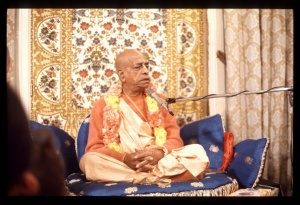SB 5.18.12: Difference between revisions
No edit summary |
(Vanibot #0054 edit - transform synonyms into clickable links, which search similar occurrences) |
||
| Line 23: | Line 23: | ||
<div class="synonyms"> | <div class="synonyms"> | ||
''yasya'' | ''[//vanipedia.org/wiki/Special:VaniSearch?s=yasya&tab=syno_o&ds=1 yasya]'' — of whom; ''[//vanipedia.org/wiki/Special:VaniSearch?s=asti&tab=syno_o&ds=1 asti]'' — there is; ''[//vanipedia.org/wiki/Special:VaniSearch?s=bhaktiḥ&tab=syno_o&ds=1 bhaktiḥ]'' — devotional service; ''[//vanipedia.org/wiki/Special:VaniSearch?s=bhagavati&tab=syno_o&ds=1 bhagavati]'' — to the Supreme Personality of Godhead; ''[//vanipedia.org/wiki/Special:VaniSearch?s=akiñcanā&tab=syno_o&ds=1 akiñcanā]'' — without any motive; ''[//vanipedia.org/wiki/Special:VaniSearch?s=sarvaiḥ&tab=syno_o&ds=1 sarvaiḥ]'' — with all; ''[//vanipedia.org/wiki/Special:VaniSearch?s=guṇaiḥ&tab=syno_o&ds=1 guṇaiḥ]'' — good qualities; ''[//vanipedia.org/wiki/Special:VaniSearch?s=tatra&tab=syno_o&ds=1 tatra]'' — there (in that person); ''[//vanipedia.org/wiki/Special:VaniSearch?s=samāsate&tab=syno_o&ds=1 samāsate]'' — reside; ''[//vanipedia.org/wiki/Special:VaniSearch?s=surāḥ&tab=syno_o&ds=1 surāḥ]'' — all the demigods; ''[//vanipedia.org/wiki/Special:VaniSearch?s=harau&tab=syno_o&ds=1 harau]'' — unto the Supreme Personality of Godhead; ''[//vanipedia.org/wiki/Special:VaniSearch?s=abhaktasya&tab=syno_o&ds=1 abhaktasya]'' — of a person who is not devoted; ''[//vanipedia.org/wiki/Special:VaniSearch?s=kutaḥ&tab=syno_o&ds=1 kutaḥ]'' — where; ''[//vanipedia.org/wiki/Special:VaniSearch?s=mahat&tab=syno_o&ds=1 mahat]-[//vanipedia.org/wiki/Special:VaniSearch?s=guṇāḥ&tab=syno_o&ds=1 guṇāḥ]'' — good qualities; ''[//vanipedia.org/wiki/Special:VaniSearch?s=manorathena&tab=syno_o&ds=1 manorathena]'' — by mental speculation; ''[//vanipedia.org/wiki/Special:VaniSearch?s=asati&tab=syno_o&ds=1 asati]'' — in the temporary material world; ''[//vanipedia.org/wiki/Special:VaniSearch?s=dhāvataḥ&tab=syno_o&ds=1 dhāvataḥ]'' — who is running; ''[//vanipedia.org/wiki/Special:VaniSearch?s=bahiḥ&tab=syno_o&ds=1 bahiḥ]'' — outside. | ||
</div> | </div> | ||
Latest revision as of 22:09, 18 February 2024

A.C. Bhaktivedanta Swami Prabhupada
TEXT 12
- yasyāsti bhaktir bhagavaty akiñcanā
- sarvair guṇais tatra samāsate surāḥ
- harāv abhaktasya kuto mahad-guṇā
- manorathenāsati dhāvato bahiḥ
SYNONYMS
yasya — of whom; asti — there is; bhaktiḥ — devotional service; bhagavati — to the Supreme Personality of Godhead; akiñcanā — without any motive; sarvaiḥ — with all; guṇaiḥ — good qualities; tatra — there (in that person); samāsate — reside; surāḥ — all the demigods; harau — unto the Supreme Personality of Godhead; abhaktasya — of a person who is not devoted; kutaḥ — where; mahat-guṇāḥ — good qualities; manorathena — by mental speculation; asati — in the temporary material world; dhāvataḥ — who is running; bahiḥ — outside.
TRANSLATION
All the demigods and their exalted qualities, such as religion, knowledge and renunciation, become manifest in the body of one who has developed unalloyed devotion for the Supreme Personality of Godhead, Vāsudeva. On the other hand, a person devoid of devotional service and engaged in material activities has no good qualities. Even if he is adept at the practice of mystic yoga or the honest endeavor of maintaining his family and relatives, he must be driven by his own mental speculations and must engage in the service of the Lord's external energy. How can there be any good qualities in such a man?
PURPORT
As explained in the next verse, Kṛṣṇa is the original source of all living entities. This is confirmed in Bhagavad-gītā (BG 15.7), wherein Kṛṣṇa says:
- mamaivāṁśo jīva-loke
- jīva-bhūtaḥ sanātanaḥ
- manaḥ ṣaṣṭhānīndriyāṇi
- prakṛti-sthāni karṣati
"The living entities in this conditioned world are My eternal, fragmental parts. Due to conditioned life, they are struggling very hard with the six senses, which include the mind." All living entities are part and parcel of Kṛṣṇa, and therefore when they revive their original Kṛṣṇa consciousness, they possess all the good qualities of Kṛṣṇa in a small quantity. When one engages himself in the nine processes of devotional service (śravaṇaṁ kīrtanaṁ viṣṇoḥ smaraṇaṁ pāda-sevanam/ arcanaṁ vandanaṁ dāsyaṁ sakhyam ātma-nivedanam (SB 7.5.23)), one's heart becomes purified, and he immediately understands his relationship with Kṛṣṇa. He then revives his original quality of Kṛṣṇa consciousness.
In the Adi-līlā of Caitanya-caritāmṛta, Chapter Eight, there is a description of some of the qualities of devotees. For example, Śrī Paṇḍita Haridāsa is described as being very well-behaved, tolerant, peaceful, magnanimous and grave. In addition, he spoke very sweetly, his endeavors were very pleasing, he was always patient, he respected everyone, he always worked for everyone's benefit, his mind was free of duplicity, and he was completely devoid of all malicious activities. These are all originally qualities of Kṛṣṇa, and when one becomes a devotee they automatically become manifest. Śrī Kṛṣṇadāsa Kavirāja, the author of Caitanya-caritāmṛta, says that all good qualities become manifest in the body of a Vaiṣṇava and that only by the presence of these good qualities can one distinguish a Vaiṣṇava from a non-Vaiṣṇava. Kṛṣṇadāsa Kavirāja lists the following twenty-six good qualities of a Vaiṣṇava: (1) He is very kind to everyone. (2) He does not make anyone his enemy. (3) He is truthful. (4) He is equal to everyone. (5) No one can find any fault in him. (6) He is magnanimous. (7) He is mild. (8) He is always clean. (9) He is without possessions. (10) He works for everyone's benefit. (11) He is very peaceful. (12) He is always surrendered to Kṛṣṇa. (13) He has no material desires. (14) He is very meek. (15) He is steady. (16) He controls his senses. (17) He does not eat more than required. (18) He is not influenced by the Lord's illusory energy. (19) He offers respect to everyone. (20) He does not desire any respect for himself. (21) He is very grave. (22) He is merciful. (23) He is friendly. (24) He is poetic. (25) He is expert. (26) He is silent.